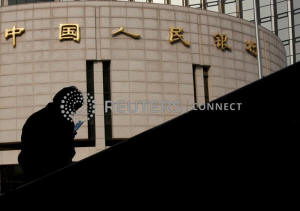Exclusive: Yuan at right level, disorderly capital flows unlikely -
China central bank official
 Send a link to a friend
Send a link to a friend
 [August 13, 2019]
By Kevin Yao and Ryan Woo [August 13, 2019]
By Kevin Yao and Ryan Woo
BEIJING (Reuters) - China's yuan is at an
appropriate level currently and two-way fluctuations in the currency
will not necessarily cause disorderly capital flows, a senior official
at the People's Bank of China told Reuters on Tuesday.
The yuan <CNY=CFXS> has weakened nearly 2.4% since U.S. President Donald
Trump threatened early this month to impose more tariffs on Chinese
goods from Sept. 1, though there are signs China is trying to stem the
declines.
"The current level of RMB exchange rate is appropriately aligned with
fundamentals of China's economy and market supply and demand," Zhu Jun,
head of the central bank's international department, said in an
interview with Reuters.
Zhu said China was "shocked" by the U.S. Treasury Department's move last
week to label China a currency manipulator, hours after Beijing let the
yuan slide past the key 7-per dollar level to its lowest level since the
global crisis.
But Zhu asserted that China will be able to "navigate all scenarios"
arising from the Trump administration's decision to label it a currency
manipulator for the first time since 1994, which rattled global markets.

China is unlikely to face serious consequences from getting that label
given the apparent lack of Group of Seven and International Monetary
Fund support for Washington's move, former and current U.S. and G7
officials said.
But some Chinese advisers and former officials have sounded alarm bells
over a possible wider conflict between China and the United States. The
year-long trade war between the world's two largest economies has
already spread beyond tit-for-tat tariffs on goods to other areas such
as technology and currency.
UPGRADING THE TRADE WAR?
The real aim of the U.S. currency manipulator label is to disrupt
China's financial markets and its economy, said Chen Yuan, former
chairman of the China Development Bank - the country's biggest policy
bank.
"The U.S. step to list China as a currency manipulating country is an
important action to upgrade the trade war into a financial war," Chen,
who remains an influential figure on economic issues, told a forum over
the weekend.
Zhu of the central bank told Reuters that in the short run, external
shocks will play a role by influencing the yuan's movements.
"That said, as long as RMB moves in an orderly manner based on market
supply and demand, such movements in either direction do not necessarily
mean disorderly movement of capital flow," she said. The yuan is also
known as renminbi, or RMB.
[to top of second column]
|

A man sits in front of the headquarters of the People's Bank of
China (PBOC), the central bank, in Beijing, China October 17, 2013.
REUTERS/Kim Kyung-Hoon/File Photo

Zhu reiterated that recent yuan volatility was a normal market
reaction to escalating trade tensions, adding "If it's preventing
such responses that would constitute real manipulation."
Analysts say a weaker yuan could help China's ailing exporters to
cope with higher U.S. tariffs amid an escalating trade war, but any
sharp yuan drops could fuel capital outflows as the world's
second-largest economy faces increased headwinds.
REPEATED PLEDGES
Chinese leaders have repeatedly pledged that they would not resort
to competitive currency devaluation to support exports, or use the
currency as a tool to cope with trade disputes.
Zhu said the yuan will be supported by China's solid economic
fundamentals, a stable debt ratio, contained financial risks,
adequate foreign exchange reserves, and favorable interest rate
spreads between China and major advanced economies.
"Over the medium and long term, we have full confidence in RMB as a
strong currency," she said.
In the second quarter, China's annual economic growth pace slowed to
a near 30-year low of 6.2%. Many analysts had expected a steadying
in the second half as earlier stimulus measures started to kick in,
but Trump's latest tariff threat is likely to further pressure
exporters and their domestic supply chains.
China's foreign exchange reserves - the world's largest - fall by
$15.54 billion in July to $3.104 trillion, central bank data showed,
amid rising trade tensions.
China burned through $1 trillion of reserves supporting the yuan in
the last economic downturn in 2015, during which it devalued the
currency in a surprise move. Since then, Beijing has shored up
restrictions on capital outflows.
(Reporting by Kevin Yao and Ryan Woo; Editing by Shri Navaratnam and
Richard Borsuk)
[© 2019 Thomson Reuters. All rights
reserved.]
Copyright 2019 Reuters. All rights reserved. This material may not be published,
broadcast, rewritten or redistributed.
Thompson Reuters is solely responsible for this content.
 |